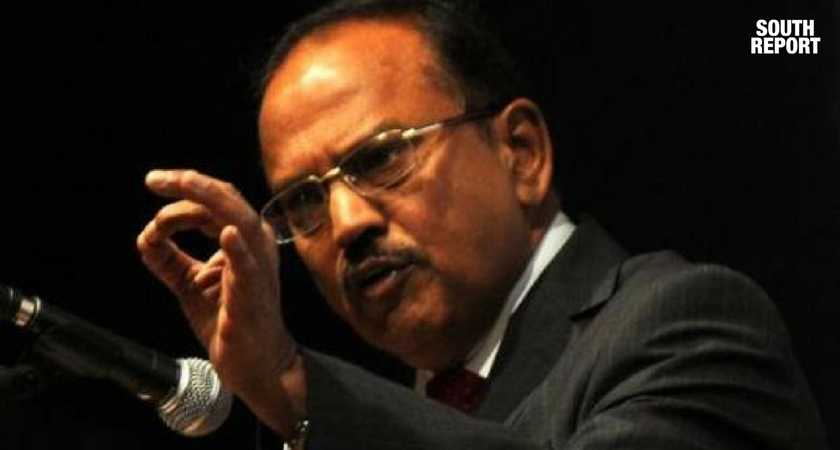DEGGE Electric Cordless Snow Shovel, 2X 3.0Ah/ 21V/ 12-Inch Battery Snow Blower with Directional Plate & Adjustable Front Handle, Snow Removal for Driveway Sidewalk, Steps, Patio (Charger Included)
$169.99 (as of December 4, 2025 14:49 GMT +00:00 - More infoProduct prices and availability are accurate as of the date/time indicated and are subject to change. Any price and availability information displayed on [relevant Amazon Site(s), as applicable] at the time of purchase will apply to the purchase of this product.)Ajit Kumar Doval, IPS (Retd), PM, PPM, KC, is a former Indian intelligence and law enforcement officer, who, since 30 May 2014, is the 5th and current National Security Adviser to Prime Minister Narendra Modi. He had previously served as the Director of the Intelligence Bureau in 2004–05, after spending a decade as the head of its operations wing.
Born on 20th January 1945 in a Garhwali brahmin family in the village of Ghiri Banelsyun in Pauri Garhwal in the erstwhile United Provinces, now in Uttarakhand. He received his early education at the Ajmer Military School in Ajmer, Rajasthan. He graduated with a master’s degree in Economics from the University of Agra in 1967, obtaining the first position.
Doval joined the IPS in 1968 in the Kerala cadre. Having taken up a lot of roles in the department, he moved on to Intelligence Bureau and was its director in 2005. After his retirement in 2014, he was appointed as India’s fifth National Security Adviser to the Prime Minister.

In June 2014, Doval played a crucial role in ensuring secure return of 46 Indian nurses who were trapped in a hospital in Tikrit, Iraq. After the family members lost all contacts from these nurses, following the capture of Mosul by ISIS. Doval, on a top secret mission flew to Iraq on 25 June 2014 to understand the position on the ground and make high-level contacts in the Iraqi government. Although, the exact circumstances of their release are unclear, on 5 July 2014, ISIS militants handed the nurses to authorities at Erbil city and two specially arranged planes by Indian Government brought them back home to Kochi. Along with Army Chief General Dalbir Singh Suhag, Doval planned a military operation against Indian militants operating out of Myanmar. The mission was said to be a success with 50 militant casualties.

It is well known that Ajit Doval has prime minister Narendra Modi’s ear and, by many accounts, a firm hand in shaping India’s foreign policy and strategic responses. It is now common to refer to his approach as the Doval doctrine. What exactly is it? ET pieced together what it could be from the public speeches and interactions Doval has had before and after he became the National Security Advisor.
Many see national security advisor Ajit Doval’s hand in the strategic shift in India’s diplomatic engagement and military preparedness. The NSA believes India has to be prepared for a two-front war. “India has two neighbours, both nuclear powers (which) share a strategic relationship and a shared adversarial view of India,” he said at the Hindustan Times Leadership Summit last November.
Here are Doval’s strategies for Pakistan, China and Kashmir, which were articulated in his public speeches and interactions:
How to Tackle Pakistan
We engage an enemy in three modes. One is a defensive mode. That is, all the chowkidars (security guards) and chaprasis (attendants) you see outside. If somebody comes here we will prevent him (from hurting us). We will defend. One is defensive offence. That is, to defend ourselves we will go to the place from where the offence is coming. The third is the offensive modde, where you go outright.
Nuclear threshold is a difficulty in the offensive mode but not in the defensive offence mode. We are working today only in the defensive mode. In defensive offence we start working on the vulnerabilities of Pakistan—it can be economic, internal security, political, its isolation internationally by exposing their terrorist activities. It can be defeating their policies in Afghanistan—making it difficult for them to manage internal political balance or internal security.
In the defensive mode if you throw a hundred stones at me, I may stop 90 but still 10 would hurt me.

How to smother Terrorists
Deny them (terrorists) weapons, funds and manpower. Funding is denied to terrorists by countering it with funds. If they (Pakistan) have got a budget of Rs 1,200 crore and we can match it with Rs 1,800 crore, they (terrorists) are all on our side. They are mercenaries.
India is a much bigger economy. We will match them money for money, deny them weapons and we will deny them recruitment. That is extremely important. (We have to) work amongst Muslim youth. We have to work among the youth through Muslim organisations. Muslim organisations are willing, and are capable and keen to save their children from their (terrorists) influence.
We not only have deterrence (against) Pakistan but even (against) the separatists. I have been with an organisation where we maintain a lot of contact with these groups. The Hurriyat or the separatists cannot be paid by the ISI (Pakistan spy agency Inter-Services Intelligence) or influenced by the ISI more than what Indian intelligence or the Indian state can do. We are much more powerful than them. Why is it that they still always tilt towards Pakistan? Why is it that there is no one who is prepared to speak on behalf of India among the Kashmiri Muslims? They cannot as strongly articulate the Indian position. (Because) they are afraid of ISI. They have been given the highest form of security, the comfort, even their medical treatment is borne by the Indian government.
This policy of appeasement and no deterrence has impelled people to become anti-national and take all the advantages from India. There is no cost involved in that. You can take all advantages and still remain antinational and still undermine India’s national interests. That is the root cause.
And I can never win because either I lose or there is a stalemate—you start war at your time, you throw stones when you want, you have peace when you want, you have talks when you want. In the defensive offence mode, we will see where the balance of equilibrium is.
Pakistan’s vulnerability is many times higher than that of India. Once they know that India has shifted its gear from the defensive mode to defensive offence, they will find that it is unaffordable for them. You can do one Mumbai, you may lose Balochistan. There is no nuclear war involved in that and there is no troops engagement. If you know the tricks, we know the tricks better than you.

Facing China
China’s comprehensive national power is about three times higher than India. And in the next 50 years we will not be able to equal it. China is converting its economic power into its military and strategic power at a very fast rate, faster than what we had anticipated. They have advanced their strategic ability build-up by about 10 years. They have become almost a blue-water Navy.
I think the best strategy for India would be to develop its missile capacity to a very high degree. China is extremely vulnerable today because all its comprehensive national power will be burst if its economic installations are threatened. And as China is progressing at a very fast pace its economic installations are coming up very fast. You know we say what sort of strategic weapons can we use against Pakistan. There is nothing.
Some cotton and wheat fields, apart from that what is there? Who do you hit? Whereas they can hit a lot of things in India to de-capacitate you. If China understands that India’s missile striking capacity is so much that we can reach Guangzhou, Shanghai and the port areas, that is, within 24 hours their economic capacity would be de-capacitated (it will be a deterrence). India has got to make up its mind to develop its strategic missile capacity.
Fortunately, I think, there has been a lot of pressure and the government has been going ahead and I think in the last three years there has been considerable progress.
Second, we still have air superiority over them. We will probably have to make up for the delays that have come up in (buying/developing) the long range and mid-air refuelling planes. There is no point in going for tanks. Tank battles are over. In China, in any case, it will not be there and in Pakistan they may not be required. So let us not go in for the development of MBT (main battle tank) but probably [spend time and money on] light combat aircraft.
But the most important thing is will you be able to outdo China in some of the selected critical areas of economic activity. We had a serious edge in IT but now they are catching up fast. We had the edge in services with our knowledge of accountancy, law and banking but probably we are losing that edge also. Manufacturing they are already ahead. We will have to think of our entrepreneurs our businessmen, we have to think the new paradigms in which growth models have to operate. Because the goodwill for India, the support for India in this area of activity globally is much more than for China.
Anti-Freeze Electromagnetic Car Snow Removal Device, Upgraded Electromagnetic Car Defroster, Rechargeable Car Interference Antifreeze (3 pcs)
$16.59 (as of December 3, 2025 14:48 GMT +00:00 - More infoProduct prices and availability are accurate as of the date/time indicated and are subject to change. Any price and availability information displayed on [relevant Amazon Site(s), as applicable] at the time of purchase will apply to the purchase of this product.)Car Trunk Folding Storage Organizer with 3 Compartments, Large Capacity Car Storage Boxes, Portable Waterproof Bags for Cargo Trunks, Universal SUV, Truck, Van
Now retrieving the price.
(as of December 3, 2025 14:48 GMT +00:00 - More infoProduct prices and availability are accurate as of the date/time indicated and are subject to change. Any price and availability information displayed on [relevant Amazon Site(s), as applicable] at the time of purchase will apply to the purchase of this product.)


